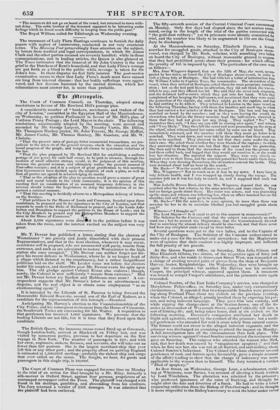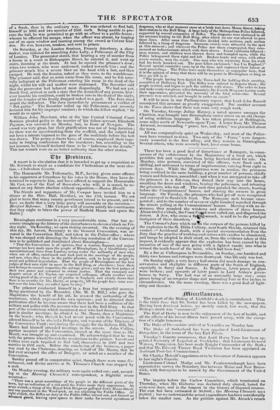The Court of Common Pleas was engaged for some time
on Monday in the trial of an action for libel brought by a Mr. Riley, formerly a silk-mercer in Oxford Street, against four persons, proprietors of an unstamped newspaper called the Town. The plaintiff was charged with fraud in his dealings, gambling, and absconding front his creditors. The Jury returned a verdict of 2501. damages. It was admitted that the plaintiff had been outlawed. The fifty-seventh session of the Central Criminal Court commenced on Monday. Only five days had elapsed since the last session termi- nated, owing to the length of the trial of the parties connected whir " the gold-dust robbery ; " yet 94 prisoners were already committed for trial, and the number was likely to be augmented to 130 ere the Graect Jury be discharged.
At the Mansionhouse, on Saturday, Elizabeth Gaston, a female searcher for smuggled goods, attached to the City of Boulogne steam. vessel, was charged by Mr. Bush, solicitor, with searching two ladies on board the City of Boulogne, without reasonable ground to suppose that they had prohibited goods about their persons ; for which offence the penalty of 10!. is imposed by law. The particulars of the case were as follows— Mrs. Jane Wingrove deposed, that on the 12th of May, she went, amen- Fulled by her sister, on board the City of Boulogne steam-vessel, in artier to visit a young lady at Boulogne. She had with her a letter of introduction from Sir William Curtis to Captain Tune, the col lllll ander. The stewardess of the vessel, when they arrived at Boulogne, asked them for some pecuniary consider. ation ; but as she had paid them no attention, they did not think she was en- titled to ally, and they offered her M. She said that site never took sixpences,, and she detained half-a-crown which they put into her hand. When they complained of her keeping the half-crown, and mentioned that they were under the protection of the captain, she said they might go to the captain, and that he had nothing to do with it. They returned to London in the same vessel, oar the following Thursday, having with them the bandbox and small bag in which they had carried a few articles of dress to Boulogne. The box and bag were searched on board by the searcher ; and as they were leaving the vessel, the stewardess, who had on the former occasion kept the half-crown, observed to them that they had not given her any thing. They replied " No." The stewardess then said, "I dare say you will be coming over again," and witness said "'Very likely." They theillCfC the vessel and were proceeding up the steps at the wharf, when witness heard her name called by some one on board. They immediately returned, and the searcher tom them they must go below to be searched. They went down, and were told by the searcher that they must un- dress to be searched. They observed to her that they came under the cap- tain's care. She asked them whether they were friends of the captain ; to which. they answered that they were not, but that they came under his protection. She then said to them, that the stewardess of the vessel was the person who had them called back, and begged that they would not mention it, or she would lose her situation. She repeated the request. They were very closely ex- amined even to their linen, and the searcher passed her hands under their stays. When they were dressing, themselves, the stewardess entered the berth. They were detained about halt an hour by the search. Mr. Bush—" Was the search oftimsive to you?" Mrs. Wingrove—" Not so much so as it was to my sister. I have been M. very delicate health, and I was wrapped up closely during the voyage. The, searcher told me it was her duty to search us, anti 1 supposed that such was. the case."
Miss Isabella Brown Reed, sister to Mrs. Wingrove, deposed that she was searched after the last witness, by the same searcher, and more closely. They had no foreign goods about them. tier sister was ashore, and was proceeding. up the steps, and witness was following her, when an officer touched her on the shoulder, and said they must no to Ile searched.
Mr. Bush—" Did the searcher, in your opinion, do more than there was occasion for her to do to ascertain whether you had smuggled goods about. you ?"
Witness—" I thought so."
The Lord Mayor—" Is it usual to net in this manner in steam-vessels ?" The Solicitor for the Customs said that the subject was certainly an awk- ward one ; but he assured the Magistrates, that the Commissioners directed that in searching the utmost delicacy should be observed, and that there never had been any complaint made except by these ladies.
Several questions were put to the two ladies, and to the Captain of the City of Boulogne. The Solicitor of the Customs endeavoured to make out a case for the searcher mind stewardess ; but the Magistrates were of opinion that their conduct was highly improper, and inflicted. the full penalty of ten pounds.
At the Queen Square Office, on Saturday, Miss Julia Gibson and Miss Elizabeth Gibson, two sisters, of the respective ages of forty and thirty-five, and who reside in Grosvenor Street West, was remanded on a charge of stealing several pairs of gloves front the shop of Benjamin Harvey, hosier, Knightsbridge. On Wednesday, they were brought up, again for examination ; but neither Mr. Burvey nor his assistant, Cooper, the principal witness, appeared against them. A summons was issued to compel Cooper's attendance, and the prisoners were again remanded.
Colonel Sombre, of the East India Company's service, was charged at Marylebone Police-office, on Saturday last, under very extraordinary eiremnstances. It appeared that two respectable females were proceed- ing along Portland Place about ten o'clock on the previous evening, when the Colonel, as alleged, grossly insulted them by exposing his per- son, and using indecent language. They gave him into custody, and while signing the charge-sheet at the Station-house, one of the fe- males (a dressmaker of Weymouth Street, named Caldwell) fell into sort of fainting-lit ; and, being taken home, died at six o'clock on the following mourning. Deceased's companion attributed her death to fright and agitation, caused by the conduct of the prisoner ; but a medi- cal gentleman who attended her said it arose solely front natural causes. The former could not swear to the alleged indecent exposure, and the prisoner was discharged on promising to attend the inquest on Monday.. A full investigation into all the circumstances then took place. The surviving witness against Colonel Sombre contradicted the testimony she gave on Saturday. The surgeon who attended the woman who died, said, that her death was caused by " sanguineous apoplexy ;" and that when he first saw her, she was not at all flurried, and said nothing about Colonel Sombre's behaviour. The Colonel (of whose character several gentlemen of rank and fortune spoke favourably, gave a simple account of the affair) tending to show that the charge of indecency was more applicable to the women than to himself. The Jury returned a verdict " Died of apoplexy."
At Bow Street, on Wednesday, George Lean, a schoolmaster, resid- ing at Whetstone, near Barnet, was accused of altering a frank written. by Lord Winchilsea. The alteration was admitted by the prisoner ; who professed ignorance of the rules of franking, and thought he might alter the date and direction of a frank. He had to write a letter requesting ordination from the Bishop of Peterborough ; and he thought it more respectful to the Bishop's secretary to send the letter under cover.
of a frank, than in the ordinary way. He was ordered to find bail, himself in 5001. and two sureties of 2501. each. Being unable to pro- cure the bail, he was permitted to go with an officer to a public-house ; whence lie effected his escape, when the officer was absent, by leaping out of an open window and running among the crowd at Covent Gar- den. Ile was, however, retaken, and sent to prison. On Saturday, at the London Sessions, Francis Atterbury, a shoe- maker, was indicted for assaulting John Lally: a Policeman of the City of London. The prosecutor stated, that hearing a cry of murder from
i .a house in a court in Bishopsgate Street, he entered it, and went up stairs, listening at the doors. At last he opened the prisoner's door; when two women, who were undressed, rushed towards him ; and the prisoner struck him a severe blow on the head with a last, and then escaped. He took the females, naked as they were, to the watchhouso. The prisoner said, that no noise came from his room, and he felt natu- rally indignant at the Policeman entering his room in the dead of the night, whilst his wife and mother were undressed. The Recorder said that the prosecutor had behaved most disgustingly. We had not yet, thank God, arrived at such a state that the domicile of any person, how- ever humble his condition, could be broken into in the dead of the night, and the females of his tinnily dragged naked to a gaol. The Jury must acquit the defendant. The Jury immediately pronounced a verdict of " Not guilty." The Recorder called up the Policeman, and severely lectured him for his improper conduct ; to which the fellow replied, " he would do so again."
William John .Marchant, who at the late Central Criminal Court Sessions pleaded guilty to the murder of his fellow-servant, Elizabeth Paynton, was executed on Monday last, in front of Newgate. The crowd was very great, but their gratification was not of long duration ; for there was no speechmaking front the scaffold, and the culprit had not been a minute exposed to the gaze of the multitude before the bolt was drawn. The penny-a-liners have, of course, employed their inge- nuity in forging confessions for the murderer; but, according to the last account, he himself declared them to he " ludicrous in the details." This last remark rests on no better authority than the other stories.



























 Previous page
Previous page